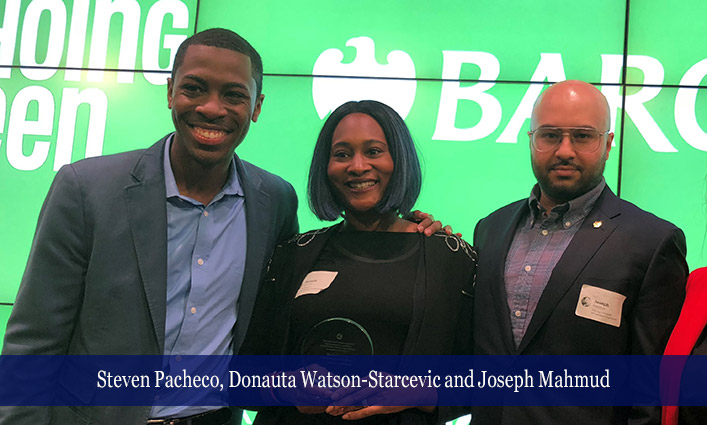
The Ron Moelis Social Innovation Fellowship was created to help John Jay students pursue business endeavors and opportunities that are socially responsible. That’s why Joseph Mahmud, Steven Pacheco and Donauta Watson-Starcevic, three inaugural Ron Moelis Social Innovation Fellows, started creating CONNECTr, a mobile app that will help people with criminal records find employers open to hiring them.
The Moelis Fellowship was created by the generous support of Ron Moelis, John Jay College Foundation Trustee and co-founder, CEO and Chairman of L+M Development Partners Inc., a leader in developing affordable, mixed-income and market-rate housing. When he established the Fellowship, Moelis said: “I wanted to work with the College to create an opportunity for students who maybe hadn’t really considered a career in business, and show them that there are ways to foster what I call ‘the double bottom line’ – doing well while doing good.”
“I saw the necessity of creating CONNECTr based on my experience of being released from prison with little to no support.” —Steven Pacheco
Professor Heath Brown, who directed the fellowship, was contacted by Echoing Green, requesting student proposals for The Future of Work Social Innovation Challenge, sponsored by Echoing Green, Barclays and Smart Cities New York. “Echoing Green is a global leader in social innovation, and I knew these students would thrive in the competition,” says Brown. “Joseph, Steven and Donauta completed a small business plan at the same time that they were finishing their spring academic semester, running for student government and preparing for graduation.”
Their hard work paid off. The CONNECTr team won the Echoing Green Social Impact Challenge with their plan to create a mobile job app that helps formerly incarcerated individuals find employment. “The competition was intense,” says Pacheco, John Jay’s next Student Council President. “However, it was surprisingly thoughtful in regards to networking and bonding.”
His teammate, Mahmud, who’s worked with the Prisoner Reentry Institute (PRI) as a Pinkerton Fellow at The Legal Aid Society, agrees. “We networked with people we would never have crossed paths with in any other setting, finalists from elite institutions like Columbia University, NYU, Penn and MIT,” says Mahmud. “None of us had a business or technology background, but we strongly believed in our idea. The adrenaline was unreal during the competition round, and we came out victorious.”
Watson-Starcevic, an English major, was struck by the supportive atmosphere amongst the competitors. During lunchtime the participants all sat together and shared the visions behind their innovations. “There was this really powerful moment when a young man blurted out, ‘Wow, it really doesn’t matter which one of us wins.’ He was right. We were all committed to social good being done,” says Watson-Starcevic.
To learn more about the CONNECTr app, and the visionaries behind it, we talked to the team and their advisor, Professor Heath Brown.
Q: What made you so passionate about creating this app?
SP: I saw the necessity of creating CONNECTr based on my experience of being released from prison with little to no support. Society’s overall impression of you as a formerly incarcerated person is that you are no longer worthy of your humanity, and this worldview impacts every aspect of your life.
DWS: I am not an American citizen. I grew up undocumented. So I understand the hopelessness associated with a lack of opportunity in a place called home. The concept behind CONNECTr stems from an overwhelming desire to be of service to a demographic that’s been systematically locked out of opportunities.
The app will give hope to people within the justice system, letting them know that there are socially conscious companies out there open to hiring them.” —Joseph Mahmud
Q: What ripple effect do you hope this app will create?
JM: I want to see our app break cultural and biased views of justice-affected individuals on a macro level. The app will give hope to people within the justice system, letting them know that there are socially conscious companies out there open to hiring them.
DWS: At the moment there’s a real struggle in American industries around diversity and inclusion. During the Ron Moelis Social Innovation Fellowship, we had the chance to visit companies and hear about their need for candidates from diverse backgrounds. Joseph tapped into that information and formed a large group of organizations ready and willing to support what we are doing with this app.
Q: What would help you take the app to the next level?
SP: An investment valued at $200,000 would allow us to do wonders in a short period of time, three to six months to be specific. Aside from all of the business and operational logistics, we greatly need an app developer and a graphic designer to help us materialize this concept as soon as possible.
DWS: We’re looking for partnerships, advisers, and additional support from employers willing to sign on to our vision. Of course, more capital would help fund the design and marketing strategy behind the app.
Q: Professor Brown, what are you most proud of most about this team?
HB: I’m most proud of how they combined their various backgrounds. Donauta has a background in writing and the arts. Steven has a background in music and student government. And Joseph has a background in public administration and has worked at several legal advocacy organizations. Innovation demands combining perspectives and learning from diverse insights. This is what every team of John Jay students brings to their collective work. It’s up to us as an institution to make these opportunities happen, where they can collaborate so productively. The sky is the limit on what Bloodhounds can do.



